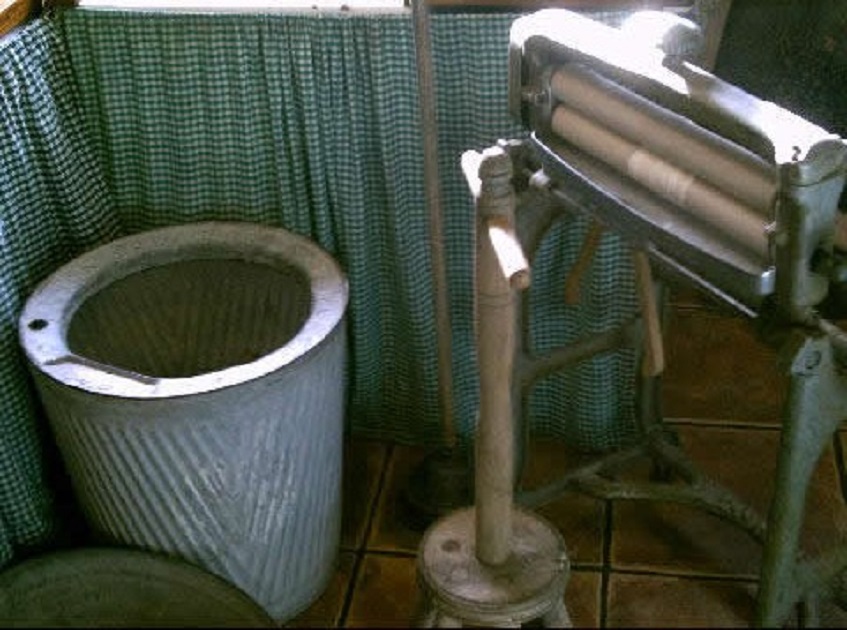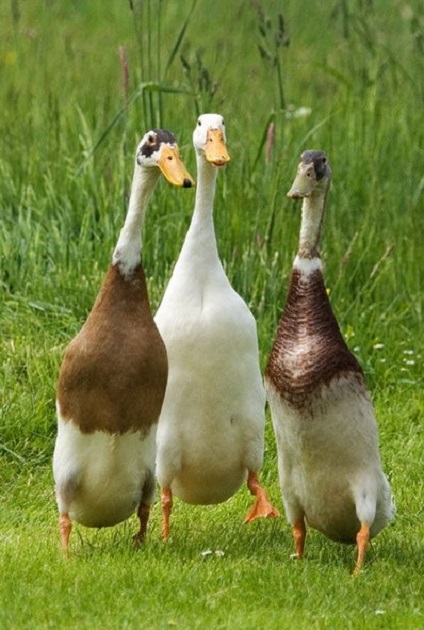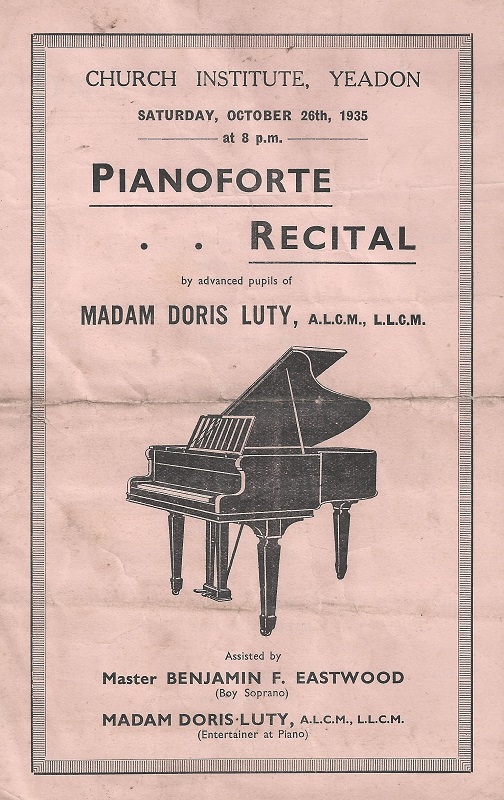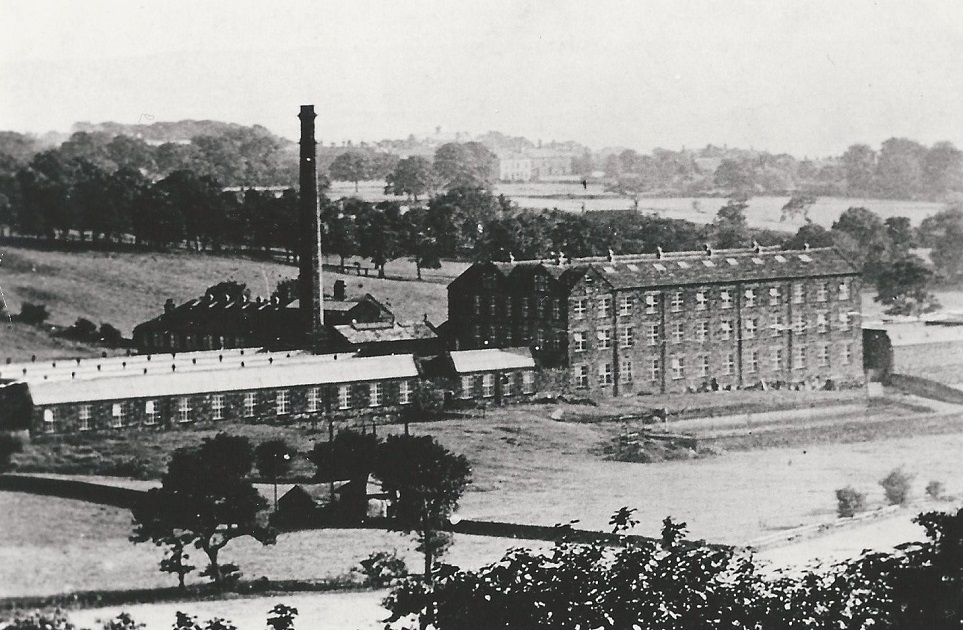| Title | My Childhood Memories |
| Date | 1926 – 1939 |
| Location | Yeadon |
| Written By | John Denison |
| Comment | See below… |
“As I said earlier men’s work was hard but the wives did not have it easy by any means.
No vacuum cleaners then for general cleaning and the stone cellar steps and floors were a down on the knees job with a scrubbing brush.”
My Childhood Memories – 1926 – 1939
“The front doorstep had to be scrubbed and whitened, it being almost a crime not to have a presentable front.
Every so often the cellar walls had to be lime-washed, this was our place of work and storage, all others in the street used them as their living room.
Mother had two ranges to be blacked-leaded, one in the cellar and another in the living room.
The latter was replaced later by a more modern fireplace but one which still had ovens.
In later years my Dad boarded this up but when my sister visited the house after his death she found that this had become a ‘feature’ in what was now a through lounge.
Our then front room was only used when we had visitors, the piano was also here.
Besides baking day another heavy day for Mam was Washing Day which occurred on a Monday, I don’t know but suppose that if it was very rainy with little chance of drying the day would be changed.
In the front cellar was a large galvanized bin into which the the washing was placed together with soap powder plus hot water.
I can’t remember where such a quantity of heated water would be obtained.
The whole would then be pounded and stirred with a ‘posser’, a long wooden shaft bearing at the end a circular disc with three prongs.
This mass of heavy washing lifted out and relieved of its water content by going through a large wooden rollered mangle.
We would ‘help’ by attempting to turn the big cast iron driving wheel which always proved too difficult but it was fun to try.
Later the tub was changed for a new fangled washing machine which was a top loader with an inner arm which rotated back and forth.
This trusty machine was still in use in the mid sixties when I and my family stayed at Rockville whilst back on leave from foreign parts awaiting our next posting.
The mangle was also replaced by a smaller rubber rollered version which was attached permanently to the cellar table, this to our delight we kids could manage.
I don’t know exactly at what stage it was introduced but ‘Dolly Blue’ was used to whiten the sheets etc.
The washing then went out on the line to dry, it didn’t necessarily need sunshine as there always seemed to be enough wind to do the job.
The drying of washing was on the level front lawn beyond which our strip of garden sloped downwards, this was changed by Dad into two flat lawns the upper having a semi-circle of large stones ‘rescued from the field, this would only take a couple of deck chairs.
This was followed by a wall of rocks leading to a larger lawn where, in the summer, our canvas ridge tent was erected where Kath (sister) and I could spend the night.
At first it was a little scary being aware of the creepy-crawlies that were around, Dad solved this problem by building a raised platform.
Ventures onto the lawn by day or night would often be accompanied by a bottle containing ‘Spanish’ and water which needed to be vigorously shaken to produce a brown drink.
This came in the form of a rock hard stick of liquorice which I have never come across since it apparently being more favored in Yorkshire and Durham areas that the rest of the country.
Beyond our garden strip was a plot owned by my Grandad, known to me as Daddad, this covered the whole width of the terrace, this is now occupied by a bungalow.
His wife, Nanna, died in early 1937, but both before and after this he spent the main part of his time either working in the plot or in the hut he had built thereon.
He was quite comfortable down there even in winter having an armchair close up to a pot-bellied stove where he would sit for hours doing nothing more than puffing away at his pipe.
A hole in the hut led to his hen house which ran all the way down to the bottom alongside the wall separating it from the Doctors field.
From the hen house we would, yet again, go after the birds with the old trick of a box balanced on a stick with breadcrumbs as bait, it was often successful but no harm came to any of the captives as they were dully released.
I had a share with Daddad in six Indian Runner ducks, for the table, he bought them whilst I had to earn my share by feeding them.
This I would do when I came home from school apparently doing a good job as they grew nice and fat.
Then one day I arrived to find the ducks laid out in a row minus their heads.
I was very upset but it cant have taken long to get over it as I recall inquiring whether they had run around without heads as they were supposed to do.
There were quite a number of hens which were fed with a mash prepared in Daddad’s living cellar, the ingredients were mixed in warm water, I can easily recall the smell of this mash which I quite liked.
‘From behind my Daddads hut I could climb the six foot high wall which brought me out near the Doc’s second orchard which could be reached undetected through undergrowth.
Daddad colluded in this activity since he let me keep the spoils in the hut, not many were eaten as they were quite green and sour.
I suppose he eventually threw them out.
Just beyond the wall was an avenue of trees through which ran a Radio Relay wire which transmitted programmes to receivers in peoples houses who perhaps could not afford or did not want to own a Radio.
Radios then were often run off wet batteries which had to be taken away every so often to be recharged, quite a chore, they were heavy.
A pal and I got the idea that we could talk into these broadcasts by scraping the wire and fitting to it a microphone we had made from a converted headphone.
After broadcasting we made a hurried exit so as not to be found out – it was of course, a ridiculous enterprise.
Every day I was confined to the front room to do my hour long practice at the piano, I was not very happy about this when other kids were out playing.
If Dad was home sitting in the living room he would yell out ‘wrong’ every time I hit a bad note.
I attended the Grove School of Music run by Madam Doris Luty, she had a sufficient number of pupils to be able to put on a show at Yeadon Temperance Hall,
I performed here at the age of nine playing ‘March of the Dwarves’ which I did without music having practiced it for weeks before the event.
The whole ‘cast’ was required to sing a song ‘You can’t do that ere’ where I had to sing a solo verse but I’m sure no one in the audience could have heard my weedy voice.
I enjoyed reading and we had a number of books which could be bought through the Daily Herald by my parents, usually as Xmas presents.
Dad also bought a magazine called “Peoples of All Nations” which I found most interesting being particularly fascinated by the Papuans from New Guinea and the “Wild Men of Borneo”.
I wonder what my reaction would have been if it had been foretold that thirty years on I would spend six months in Sarawak and a weekend in a Dyak (Iban) longhouse!
I was given what I thought was a real treat on Saturday morning when Dad took me to Green Lane Mills this was the time reserved for cleaning.
Even though no actual work was being carried out it was still extremely noisy.
I was told the purpose of each piece of machinery.
My Grandad and Great Uncle Harry did not now work on machines being close to retirement.
They were now in ancillary employment such as packing so I was taken to see them at their place of work.
Next came a visit to the engine room where the power plant which drove the whole mill was lodged.
These were the pride and joy of the mills, one next to the Albert Square had a large viewing window facing the square.
Being close up to one of these engines and hearing the noise produced was quite something else.
They were really high maintenance being brightly painted with highly polished brass work.
The trip concluded with a trip to the canteen, the part I remember most was climbing up the metal stairs to get my pot of tea and a bun.
Dad was a member of the Dyers Club located opposite the school but rarely went there as he was not a drinking man.
However, on a couple of occasions I was taken there on a Sunday morning when Housey-Housey (Bingo) was played.
When a number was called it was covered by small square pieces of lino.
I found the club a strange place smelling of stale beer and tobacco where men were playing billiards and snooker in a fug of smoke from pipes and cigarettes”.





